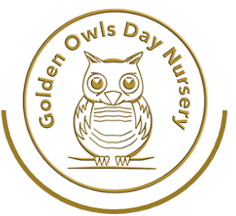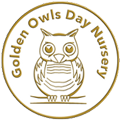EYFS 7 Areas
At Golden Owls Day, the Early Years Foundation stage (EYFS)
underpins our policies and ethos of our nursery.
EYFS
We follow the Early Years Foundation stage (EYFS) at Golden Owls which underpins our policies and ethos of our nursery. Further information regarding the EYFS for all early years settings is set out below.
The Early Years Foundation Stage (EYFS) is how the Government and early years professionals describe the time in your child’s life between birth and age 5.
This is a very important stage as it helps your child get ready for school as well as preparing them for their future learning and successes. From when your child is born up until the age of 5, their early years experience should be happy, active, exciting, fun and secure; and support their development, care and learning needs.
Nurseries, pre-schools, reception classes and childminders registered to deliver the EYFS must follow a legal document called the Early Years Foundation Stage Framework.
The EYFS Framework exists to support all professionals working in the EYFS to help your child, and was developed with a number of early years experts and parents.
It sets out:
- The legal welfare requirements that everyone registered to look after children must follow to keep your child safe and promote their welfare
- The 7 areas of learning and development which guide professionals’ engagement with your child’s play and activities as they learn new skills and knowledge
- Assessments that will tell you about your child’s progress through the EYFS
- Expected levels that your child should reach at age 5, usually the end of the reception year; these expectations are called the “Early Learning Goals (ELGs)”
There is also guidance for the professionals supporting your child on planning the learning activities, and observing and assessing what and how your child is learning and developing.
Much thought has been given to making sure that your child is as safe as possible. Within the EYFS there is a set of welfare standards that everyone must follow. These include the numbers of staff required in a nursery, how many children a childminder can look after, and things like administering medicines and carrying out risk assessments.
You can find out about the quality of your child’s nursery and other early years providers in relation to the EYFS Framework by checking what the Government’s official inspection body for early years, Ofsted,has to say about it. You can find this information at www.ofsted.gov.uk/inspection-reports/find-inspection-report.
The EYFS Framework explains how and what children will be learning to support their healthy development.
Your child will be learning skills, acquiring new knowledge and demonstrating their understanding through 7 areas of learning and development.
Children should mostly develop the 3 prime areas first. These are:
- Communication and language;
- Physical development; and
- Personal, social and emotional development.
These prime areas are those most essential for children’s healthy development and future learning.
As children grow, the prime areas will help them to develop skills in 4 specific areas. These are:
- Literacy;Mathematics;Understanding the world; and Expressive arts and design.
These 7 areas are used to plan children’s learning and activities. The professionals teaching and supporting children will make sure that the activities are suited to your child’s unique needs. This is a little bit like a curriculum in primary and secondary schools, but it’s suitable for very young children, and it’s designed to be really flexible so that staff can follow your child’s unique needs and interests.
Children in the EYFS learn by playing and exploring, being active, and through creative and critical thinking which takes place both indoors and outside.
It is important that parents and the professionals caring for children work together. You need to feel comfortable about exchanging information and discussing things that will benefit your child. These conversations will either need to be with your childminder or, in a larger setting like a nursery, with your child’s “key person”. This is the person who:
- Is your main point of contact within the setting
- Helps your child to become settled, happy and safe
- Is responsible for your child’s care, development and learning
- Takes a careful note of your child’s progress, sharing this with you and giving you ideas as to how to help your child at home
You should be able to get information about your child’s development at any time and there are two stages (at age 2, and again at age 5) when the professionals caring for your child must give you written information about how he or she is doing.
At some point after your child turns 2, the professionals working with your child must give you a written summary of how your child is progressing against the 3 prime areas of learning:
- communication and language;
- physical development; and
- personal, social and emotional development.
This is called the progress check at age 2. This check will highlight areas where your child is progressing well and any where they might need some extra help or support – and how mums and dads and other family members or carers can work with the key person to help. You might find it useful to share the information from the check with other professionals such as health visitors (who can use it as part of the health and development review).
Please ask a member of staff for further information on how Golden Owls implements the EYFS.

